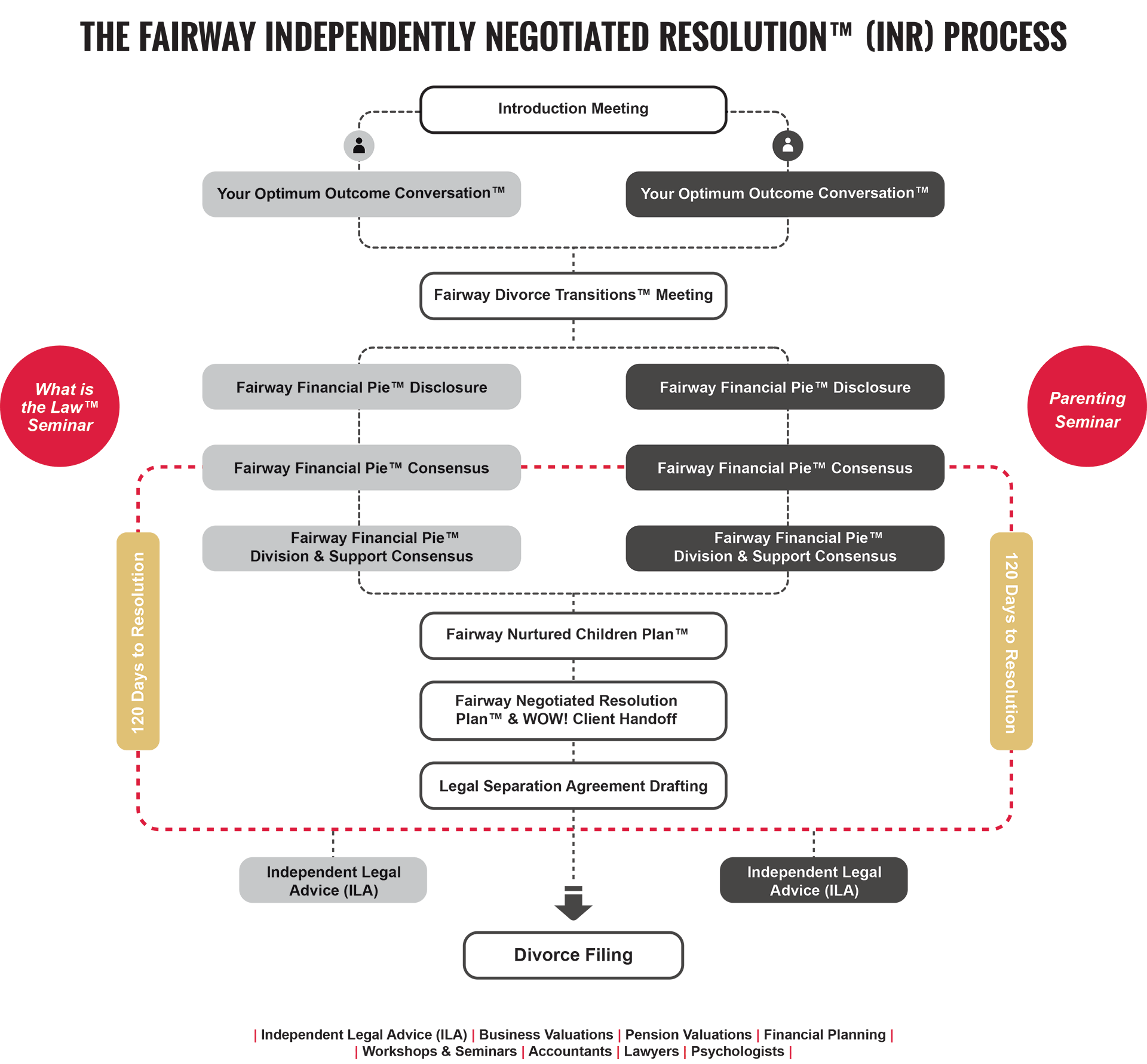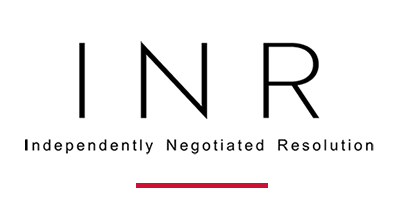Capturing good intentions: preparing prenuptial, postnuptial and cohabitation agreements
A prenuptial, postnuptial and cohabitation agreement is meant to protect each of you while moving the relationship forward in a positive way. Fairway's financial mediators apply our proven step-by-step INR™ (Independently Negotiated Resolution™) process to guide you through your decisions while gathering financial and other information to agree on the terms jointly. Following decision-making, the terms are captured into a legally binding contract. Fairway is committed to ensuring that legal rights and mutual respect are the foundations for the agreement. Understating the terms' implications will be set out as you sign and get independent legal advice.
 There is a flip side worthy of sharing. Many relationships end due to the lack of sensitivity or understanding of the emotional implications of signing prenups. While protecting one's assets coming into a relationship is understandable and prudent; it is more about how you do it vs doing it. The challenge is that you are entering into a long-term relationship with hopes and dreams. To some, that means "I am all in (money and all)," and to others, that means "I am all in, but I also need to protect the what-if scenario." Neither is right or wrong, but both have their pitfalls and upsides.
There is a flip side worthy of sharing. Many relationships end due to the lack of sensitivity or understanding of the emotional implications of signing prenups. While protecting one's assets coming into a relationship is understandable and prudent; it is more about how you do it vs doing it. The challenge is that you are entering into a long-term relationship with hopes and dreams. To some, that means "I am all in (money and all)," and to others, that means "I am all in, but I also need to protect the what-if scenario." Neither is right or wrong, but both have their pitfalls and upsides.
Pros and cons of signing a prenuptial
In the case of deciding to get prenuptial, there will be an automatic (whether admitted or not) underlying feeling of "you do not trust me", or "you are not 100% committed". The person requesting it is likely afraid to have the conversation as they want to protect themselves but are concerned that it might appear as though you don't trust them or you are not 100% committed. Either scenario can be problematic. If the conversation and process are not handled with kid gloves, you risk laying a very negative foundation for your relationship or worst case, it ends. The key to success is that both parties feel respected and validated and that the terms are fair. A fair agreement contemplates assets acquired before the marriage and during the relationship or marriage. It will also consider the division of assets and support given several different timelines, such as 5, 10, 15 and 20-plus years. Clearly, the longer the relationship, the more co-mingled, and rightly so, your assets will become. Both parties must feel respected and loved during the negotiations. If one person signs a prenuptial or a cohabitation agreement to appease the one with a higher net worth, the outcome will likely be distrust and discord over time. Both of you must feel comfortable expressing intentions, both emotional and otherwise. At Fairway, we are advocates of happy marriages and long-term relationships, and we are both experienced and committed to working with you for a positive the road ahead.
Pros and cons of not signing a prenuptial
While it is common to provoke negative feelings initially, there are upsides to having a prenup. It is often considered that the prenup is to protect the one with the large majority of assets; however, if a prenup is properly drafted, it should also protect the person with fewer assets. Often, in the case of divorce, the person with more assets has the upper hand over professionals and is perceived to have more power and influence due to the differences in money. A well-thought-out prenuptial should contemplate the best interest of both people, which means that the person with fewer assets needs to be protected by an appropriate share of the wealth and perhaps ongoing spousal support. When a couple cohabits or gets married, there is often a shift in the roles that are different during a relationship or marriage than before. For example, someone may give up part of their career to support their partner's status. If the person with the higher wealth has to travel a lot, for example, it makes it very difficult for the other partner to keep their career going. These kinds of sacrifices, and many more, are ultimately in the best interest of the relationship and the family but must be contemplated when determining the terms of the agreement. Fairway's financial mediators will take the time to not only look at the assets today but also consider the plans for the future and set out different scenarios of support and division of assets based on the length of time you're together and if there are children involved. The Fairway Method™ using the INR™ process ensures that all questions are answered for both of you individually and separately so you feel cared for and protected in the agreement.
 Fairway's financial mediators will get the job done while protecting your relationship
Fairway's financial mediators will get the job done while protecting your relationship
You want to be careful about who you hire to help you through this process. Getting the right fit is very important to protect your relationship's integrity. The professional must possess the skill set and ability to facilitate conversations and move relationships forward positively while facilitating honest and open communication. They also need to know that relevant laws and the implications if the relationship ends. Many times, prenuptial are overturned due to lack of diligence or neglect in the agreement. Knowledge and experience are essential for the success of these conversations and the agreement's outcome. At Fairway, we're committed to helping you both.
The average cost of a separation/divorce in Canada is now over $51,000
Client testimonials
Success comes in many forms. For us, it is hearing back from our clients and reading how we have changed their lives for the better. These stories are the reason we do what we do.

Just wanted to say thanks again for everything you did to try to get us to this point! Wasn’t an easy process for us and I know not for you as well. So thank you so much for doing what you do!
- Saskatoon Client February 2020
The Unique Fairway Method
Divorce is difficult. We make is easier from start to finish. The Clear Road to a New Life®

Fairway Divorce Solutions meets your needs
Locations
Helping Canadians with divorce mediation since 2006, with more than 25 Divorce Resolution Mediators in more than 12 locations.
Frequently asked questions
Cohabitation is a living arrangement when an unmarried couple lives with each other like a marriage. Cohabitation may create legal obligations between partners, including parenting, child and spousal support, and the division of assets.
The Divorce Act does not apply to couples who are not married. To fill in the gap for such cases, many of the provinces in Canada have provisions in their Property or Family Acts to cover the areas of guardianship, parenting time, child support and support for a common-law partner.
Dividing property between cohabiting couples is more difficult however some provinces have made the legal provisions like that of a marriage. In the regions that do not have Acts to cover cohabitation, then in the case of a relationship breakdown, you must rely on case law developed through years of litigation. Unfortunately, this is a murky area of law and litigation and lawyers can offer little certainty.
There is a trend in the Provinces to align the laws around cohabitation with those of a marriage. In this regards many couples are selecting to deal with the issues in advance to avoid the potential high conflict if their relationship ends.
A cohabitation (cohab) agreement is a legally binding agreement that sets out important aspects of the relationship. These agreements have become much common in recent years because of changing marriage relationships.
A cohabitation agreement is a legally binding document, if it is executed properly. It should address areas where there could be a dispute when faced with a relationship breakdown.
A cohabitation agreement may include decisions about the terms when living together and what will occur in the case of a breakup. These agreements generally include terms that:
- Deal with the property each party brought into the relationship
- Set out how to divide accumulated assets
- Define how bank accounts will be kept
The Family Law Act governs parenting and spousal support; however, a cohabitation agreement can be used to document a couple’s intentions with respect to the following:
- The payment of spousal and child support support
- Parenting arrangements for any children
- Each parties’ intentions toward children from previous relationships
There are numerous benefits to creating a cohabitation agreement. Upon breakdown of a relationship, a properly drafted cohabitation agreement helps reduce fighting, stress, emotional distress and legal fees. While most matrimonial laws set our property to be split 50/50, there are provisions in most provinces for pre-marriage assets and exemptions so you may be partly protected in this regard. If you want to be certain your fully protected, a cohabitation agreement should be considered.
While you may feel, you should have an agreement, approaching the subject with your partner can be a daunting task and if not handled with kid gloves may destroy your relationship. We know that making a Cohabitation Agreement will be hard. It is difficult and emotionally taxing trying to decide how you would end your relationship while it is still going strong or before you take the exciting step of moving in together. Fairway Divorce Solution’s negotiators use our step by step modified INR Process to facilitate these conversations so that you can lay the foundation for a great future versus injecting unnecessary stress and conflict in your relationship. A cohabitation agreement prepared by Fairway will give you the relief you want when entering this next phase of your life together and protect the relationship you are building.
A prenuptial agreement is a legally binding agreement created by two people before marriage. It is commonly abbreviated as “prenup.” The content of a prenup may vary significantly, and while it is like a cohabitation agreement in the areas it covers, it is strictly drafted prior to marriage to address what will happen in the case of a marriage breakdown. The agreement specifically sets out the details with regards to division of property and in many cases, spousal support. Normally issues around parenting and child support are not found in these agreements as the terms with regards to parenting are always negotiable depending on what is in the best interest of the children at the time. In the prenuptial agreement, the party bringing more assets to the marriage is likely setting out terms with regards to how he/she may protect them in the case of a divorce. The more detailed the agreement is, the more likely it will stand up under the scrutiny of a lawyer at the time of a marriage ending. The more specific it is, the better and reduces the changes of conflict around interpretation.
Prenup agreements are used to protect pre-marriages assets. It is a matter of personal choice, and there are strong opinions both in support of these kinds of agreements and opposed. If you want no confusion between pre-and post-marriage assets then a prenup could be wise.
Common law, otherwise referred to as Adult Interdependent Partners (AIP) are the terms used to define two people living together in a relationship of interdependence for a certain period.
When two people are living together and are considered common law, both parties should have a clear understanding of the expectations around money and children if the relationship should end. Having an agreement that sets out the decisions, will prevent legal issues after a breakup.
The rules in Canada have been changing so it is prudent to understand how the laws apply to your situation.
Fairway provides couples with the ease of mind when entering into an AIP by delivering a comprehensive Adult Interdependent Partnership Plan. We are trained to ask the difficult questions, so you have addressed the different scenarios.
Less Conflict. Less Cost.
Avoid expensive lawyers. Fairway has a diverse, skilled and experienced team of experts in conflict analysis, mediation and negotiation. We are the authorities in settling disputes and conflicts.









